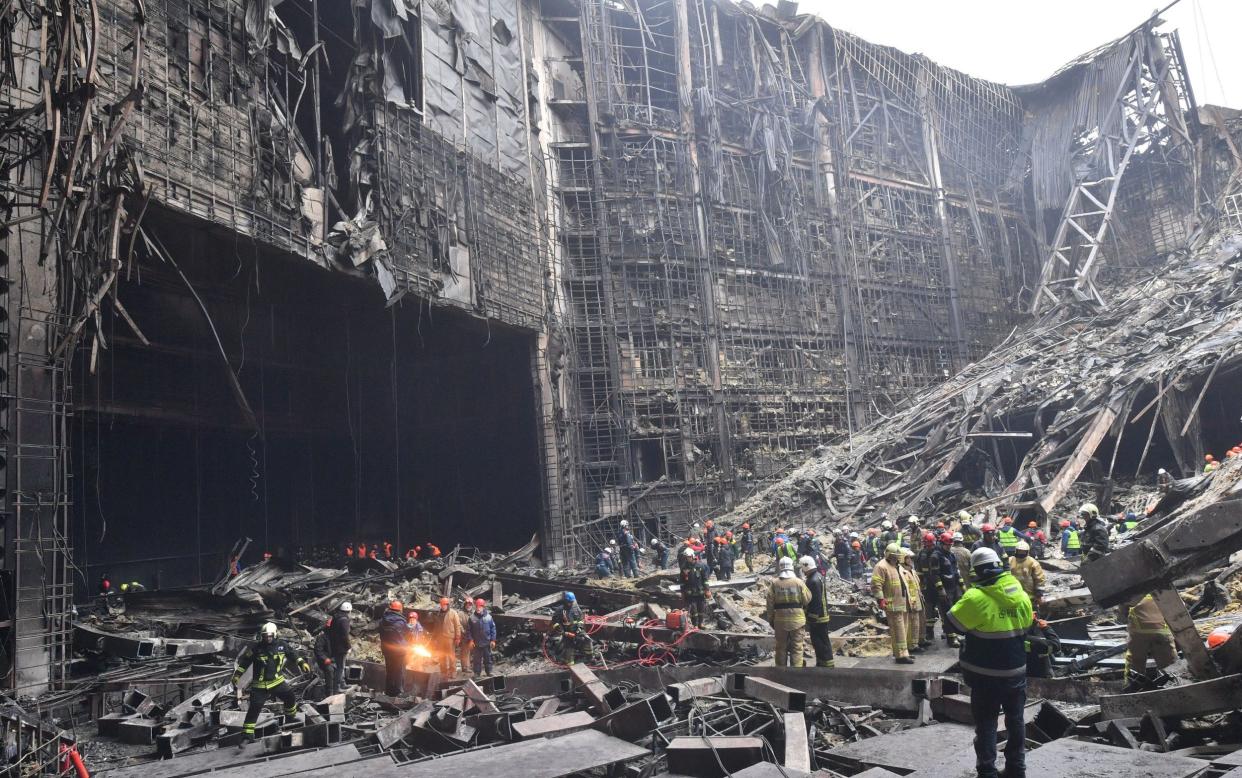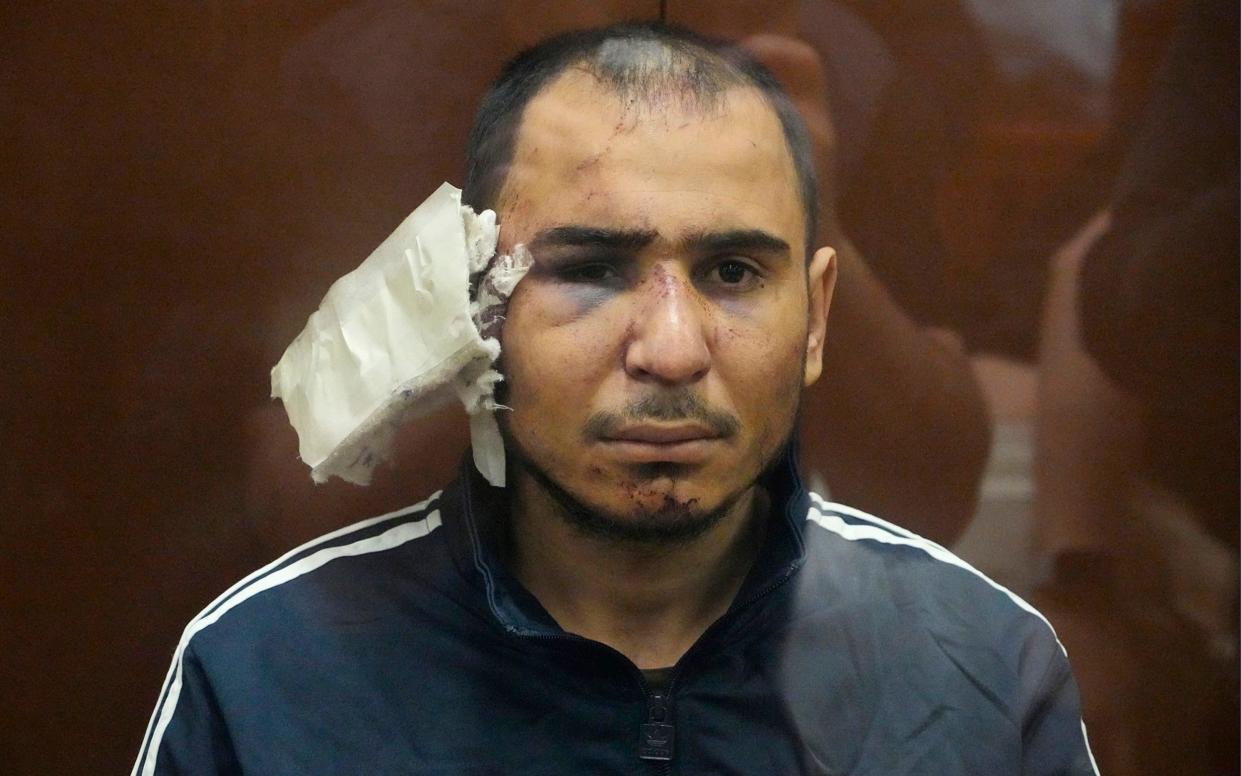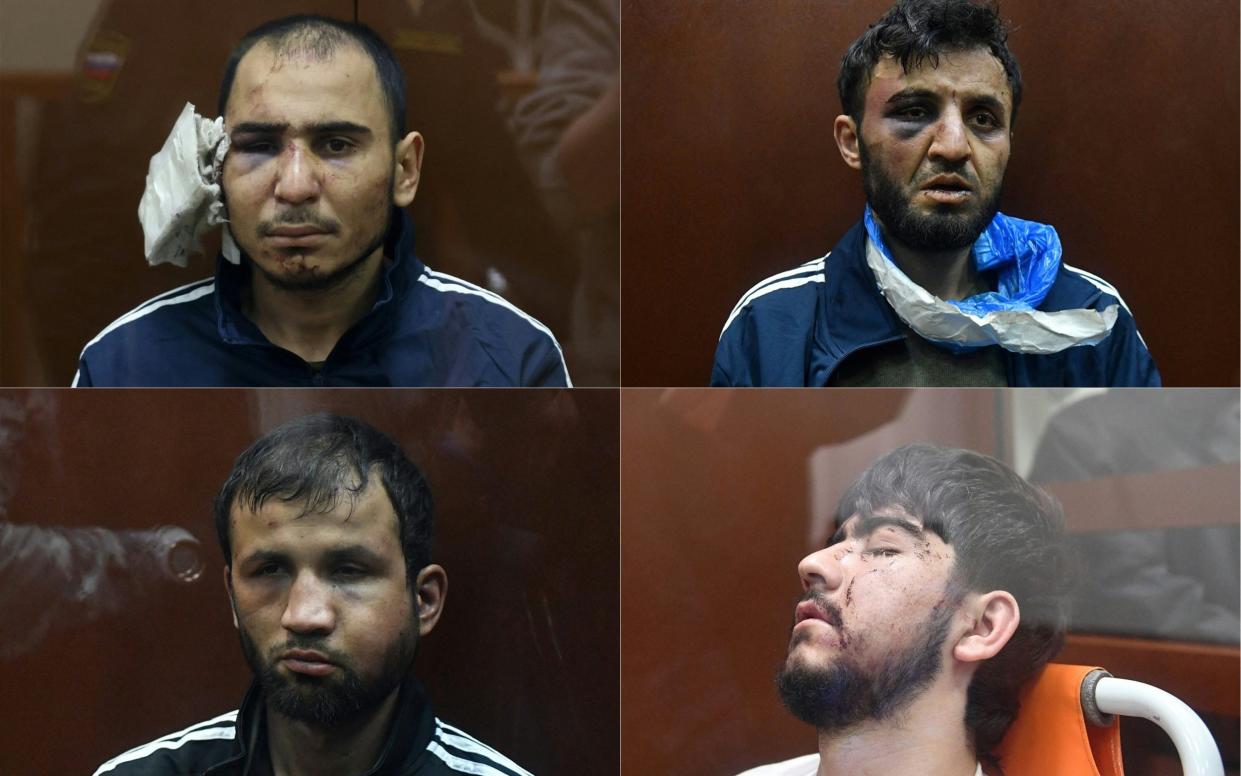Putin acknowledges radical Islamists carried out Moscow terror attack

Vladimir Putin has acknowledged for the first time that radical Islamists carried out the worst terrorist attack in Russia in two decades but repeated his unproven claim that Ukraine was also involved.
It comes as the Kremlin faces calls to bring back the death penalty with videos emerging of Russian security officers torturing suspected attackers who were detained over the weekend, including cutting off one man’s ear and force feeding it to him.
Speaking at a televised video conference with senior officials on Monday evening, Putin suggested the murderous attack “just a link in a whole series of attempts by those who have been at war with our country since 2014 by the hands of the neo-Nazi Kyiv regime”, he said.
“Of course, it is necessary to answer the question, why after committing the crime the terrorists tried to go to Ukraine? Who was waiting for them there?” he added.
The Islamic State terrorist group has claimed responsibility for the Friday night attack that killed at least 139 people.
The United States has said it has intelligence that confirms that claim and that the group appears to have acted alone.
Ukraine has strongly denied any involvement in the attack.

Putin did not refer specifically to Islamic State, which has claimed responsibility, but said the killings were carried out by extremists “whose ideology the Islamic world has been fighting for centuries.”
Putin has been urged to restore the death penalty following the Islamic State attack on Crocus City Hall.
The calls from senior allies of the Kremlin came after authorities released footage of officers torturing the suspected attackers, including one man having his ear cut off and force-fed to him.
At least 137 people were killed when gunmen burst into the concert hall on the outskirts of Moscow on Friday evening.
Islamic State (IS) has claimed responsibility for the attack, which was the worst terrorist incident in Russia in more than a decade.
A video released by the terror group showed the attackers gunning people down at point-blank range and slitting at least one victim’s throat.
Four suspects, all of them citizens of Tajikistan, were detained and charged with terrorism over the weekend. At least two of them showed signs of torture when they appeared in court.
The men were identified as Dalerdzhon Mirzoyev, 32, Saidakrami Rachabalizoda, 30, Shamsidin Fariduni, 25, and Mukhammadsobir Faizov, 19. The charges carry a maximum sentence of life imprisonment.
Three more men were arrested on Monday afternoon.
Video released on Russian social media showed Russian security officers torturing the suspects, including one being subjected to electric shocks to his genitals.
In one video, the suspect named as Rachabalizod spits as he is fed his own ear. Appearing in court on Sunday, he had a large bandage attached to the right side of his head.
The attack sparked multiple calls for the death penalty to be restored following a three-decade moratorium.
Dmitry Medvedev, Russia’s former president, wrote on his Telegram channel: “Do they have to be killed?” he asked. “They have to be. And will be.”

Vladimir Vasilyev, the head of the United Russia faction in the state Duma, Russia’s lower house, told Russian television on Saturday that capital punishment was being “considered seriously”.
“There are a lot of questions being asked about the death penalty now. This topic will certainly be deeply professionally, and meaningfully studied … and a decision will be made that will meet the moods and expectations of society.”
Yuri Afonin, the deputy head of the Duma’s security committee, called on Saturday for capital punishment to be restored in cases of “terrorism and murder”.
The Kremlin on Monday said it was not currently considering reintroducing capital punishment.
Dmitry Peskov, the Kremlin’s spokesman, said: “We are not taking part in this discussion at the moment.”
Mikhail Mishustin, the prime minister, said “the perpetrators will be punished, they do not deserve mercy,” but did not explicitly endorse capital punishment.
Russia has observed a moratorium on the death penalty since it joined the Council of Europe in 1996.
Mr Medvedev and some other officials called for it to be reinstated after Russia was kicked out of the body following the full-scale invasion of Ukraine in 2022, but critics have said it would require a major reworking of the Constitution.
Mr Peskov declined to answer a question about the alleged torture of suspects and said he could not comment on the IS claim of responsibility while the investigation is ongoing.
Vladimir Putin in an address to the nation made no mention of jihadist involvement in the attack and instead linked it to Ukraine, saying the attackers “tried to escape and were travelling towards Ukraine” and that “a window” had been prepared for them to cross the border.
He presented no evidence to back up the claim. Volodymyr Zelensky, Ukraine’s president, strongly denied the allegation. The United States said its intelligence showed IS acted alone.
Several Kremlin-friendly media outlets and commentators sought to promote Putin’s theory on Monday, however, raising fears that the Russian government planned to use the attack as an excuse to further escalate the war with Ukraine.
“We are not talking about Isis here. It was the khokhly,” said Margarita Simonyan, the editor-in-chief of the RT channel, using a term used pejoratively in Russia to denote Ukrainians.
In an apparent reference to the suspects’ torture, she added that she felt “extremely satisfied” when she saw their condition as they were led into court.
Komsomolskaya Pravda, a widely read tabloid, quoted a commentator blaming the “British special services and the Americans and Ukrainians” for the attack.
On Monday, Emmanuel Macron, France’s president, warned Moscow against any “exploitation” of the attack, saying it would be “cynical and counterproductive for Russia to use this context to try and turn it against Ukraine”.
He said it was a branch of IS that “planned the attack and carried it out”, adding this group had also plotted attacks in France.
Russia has suffered repeatedly from Islamist terrorism over the past 30 years, including in the 2004 Beslan school siege that killed 334 people, including 186 children.
On March 7, the FSB, the successor to the KGB, said it had killed members of an IS cell in Kaluga, southwest of Moscow. It said the group had been plotting an attack on a synagogue.
Heightened terror threat
On the same day, the US embassy in Moscow issued a public warning to American citizens warning them to stay away from concerts because of a heightened terror threat.
The four suspects do not appear to have had previous convictions or security alerts attached to their names, which may partly explain why Russian authorities failed to detect the plot.
Human rights group gulagu.net, which documents the horrors of Russia’s prison system, said the open torture of suspects reflected changes in Russian society.
“For more than 10 years, we have been consistently exposing torture and its systemic nature in Russia,” it said.
“It is obvious that sanctions for these tortures, as well as for the torture of Ukrainian prisoners, are given from the very top.”
Dmitry Kolezev, exiled editor of Republic media, said: “Torture is, unfortunately, commonplace.”
“What is unusual here is that the security forces used to bashfully hide this. But now they are proud of it and, apparently, they themselves release photographs of torture to friendly Telegram channels.”
Pavel Krasheninnikov, the chairman of the Duma committee on state building and legislation, told Russian agencies that the debate over the death penalty could be a distraction from the real task of preventing such atrocities from happening again.


